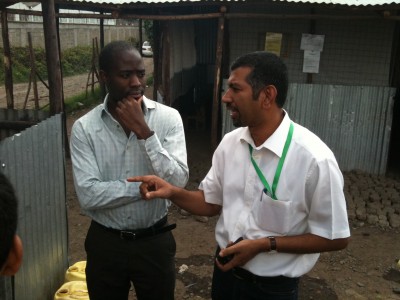The Spectrum of Sacrifice: Managing Tradeoffs in Social Enterpreneurship
Editor’s Note: This post originally appeared on the Acumen Fund blog and is republished here with permission.
I just returned from the Acumen Fund Global Fellows mid-year meeting in Nairobi, Kenya. The mid-year is one of the most critical parts of the Fellowship. It is the time when the Fellows get the opportunity to reconnect, share experiences both personal and professional, and think about what they have learned related to our work and their vision for change.
During this mid-year I was reminded not just of our vision for change or the model that it takes to get there, but most importantly I was reminded of the leaders that make that change possible.
Our first day we met the Managing Director of one of the most successful microfinance banks in Kenya, which has an in-depth knowledge of rural markets. This individual has worked with the bank since its inception (funded by a USAID grant) over 20 years ago. When the USAID grant was about to run out, he and his team realized that in order to keep their organization alive they had to generate revenue and build a successful business model that could serve the poor. As he put it, “Foreign seeds should yield indigenous fruit”. In order to truly cultivate that “indigenous fruit”, this man and his team made the decision to trade the donations of the development banks for the capital of the free market place.
The following day we went to visit Bridge International Academies, a for-profit chain of low cost private schools in the slums of Kenya. In two and a half years, they have built 22 schools in Nairobi and are planning rapid expansion in East Africa and India. As we sat listening to Ram Hariharan, 2009 Fellow and current director of operations at Bridge, we learned how the company has to make significant tradeoffs to keep the school low cost enough to allow it to scale and maintain profitably. One example is that the schools do not have free feeding programs for the kids. Several Fellows asked if this could be provided by someone like the World Food Program. Ram’s response was that while this could work for a period of time, what happens when the funding runs out and expectations have been set for the schools? This would significantly impact their ability to maintain standards and accountability while rapidly scaling the chain.

(2009 Fellow Ram Hariharan describes Bridge International Academies to 2011 Fellow Shane Heywood. Image credit: Blair Miller).
I could go on and on about the tradeoffs involved in non-profit vs. for-profit structuring. However, this trip, perhaps more importantly, reminded me of what those tradeoffs mean for individuals. The individuals who are a part of this field run the gamut from the a young mother who sent her child to Bridge International Academies by cutting back significantly on food for her family to the corporate systems engineer who left her job to work at Bridge, leaving behind a lucrative career path to focus on social change. Both of these individuals have chosen to make sacrifices, but let’s be honest the absolute sacrifice varies immensely.
In many ways this is one of the unique parts of the Acumen Fellows Program: we ask that each Fellow engage in conversations like these on a regular basis For example, in the mid-year seminar we each reflected on what is most important to us. Answers ranged from family, to accomplishment, to recognition, to social impact. We discussed the financial and personal challenges of living and working in rural India, the slums of Kenya, or amidst the unrest in Pakistan. We explored the reality of the financial burden that keeps so many low income customers from accessing the private goods and services provided by Acumen Fund investees. Finally, we asked how can we create better systems to make social entrepreneurship more inclusive?
This conversation is perhaps one of the most important ones for leaders in our field. How do you, as an individual, weigh the realities of how much change is needed and how much suffering exists in the world with your own personal well-being, familial commitments, and personal and professional obligations? What I know for sure is that there is no right answer to this question. But in a world where we finally have the opportunity to end poverty I think it is our obligation to ask it. So, what does your “Life of Immersion” look like?
Please like NextBillion on Facebook and follow us on Twitter.
- Categories
- Uncategorized
